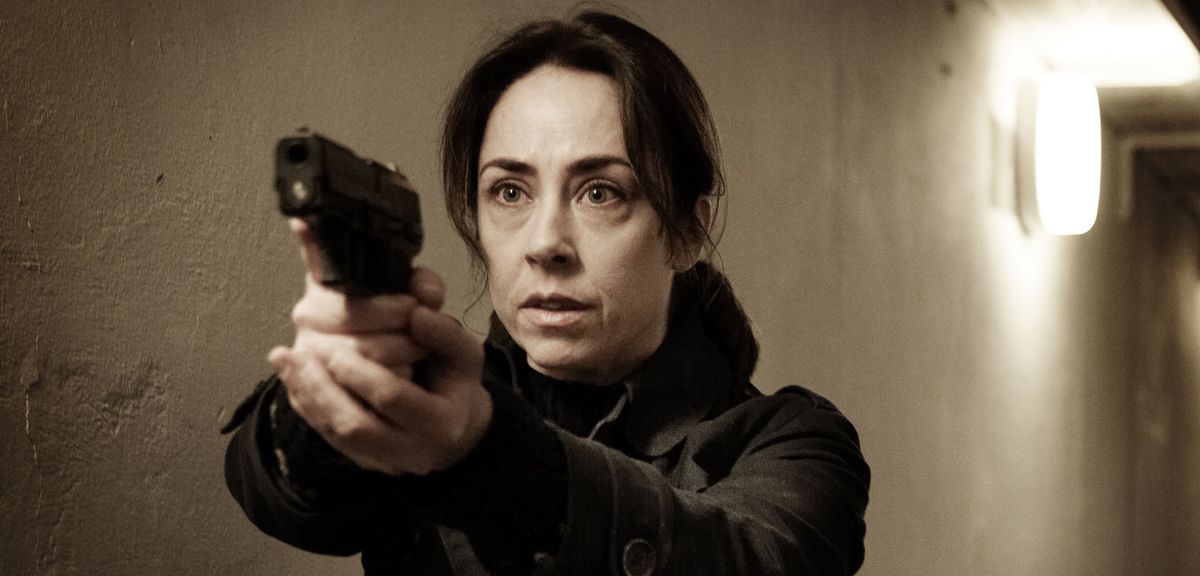 ★★★★
★★★★
“Happy ends are for losers!”
Spoilers will follow! At one point, Scandinavian noir, was a genre mostly well-known only in Europe and to die-hard crime novel readers. But the ground-breaking female characters who have made the genre recognized worldwide in the past two decades consists of a trio. In addition to the most well-known, Lisbeth Salander of the Millennium series, there is Saga Norén of Bron: The Bridge, and Sarah Lund of The Killing. All of these have been remade in a number of other countries – not only America. But I think it’s uncontroversial to say that none ever came close to the originals. There is something to the way these series are constructed and conceptualized by our Scandinavian neighbours, that film crews in other countries just can’t re-create.
It’s not just, for example that American productions have higher budgets. Other, non-American remakes or “new versions” aren’t able to re-create that special “air” either. It’s a specific atmosphere these series have, even though those in charge of production usually understand the attraction of the original. Although Scandinoir existed well before those three series. Elements like more realistic depictions of criminal acts, very often with social aspects interwoven, and investigators with personal problems, can be traced in literature back to the 1960s, and on television to the 1970s and 80s. A realistic local background with more down-to-earth investigators, as opposed to classic Anglo-American super-detectives like Sherlock Holmes, or private investigators like Philip Marlowe, started around then, and can still be found in long-running classic German TV crime series, Tatort (literal: “scene of the crime”).
Though before these new shows, some starring some quite “damaged” women, hardly anyone except die-hard fans of crime stuff noticed. The show that served as a wake-up call for everything was The Killing. This Danish-German co-production ran for three seasons, from 2007-2012. [It seems whenever there is a new Scandinavian crime series, ZDF, the second public TV channel of Germany, is involved. They also co-produced the Millennium and Bridge shows, among other Scandinavian series.] The original version totalled 40 episodes of 55 minutes; some countries broadcast it as 20 episodes of around 110 minutes. The German version was like that: you always can tell the break between episodes, by the two-minute montage, with music underneath. It received a number of remakes, in America, Turkey and Egypt.
As typical for these Scandinavian shows, they are slow-burn mysteries. This means taking their time, introducing countless suspects and going far beyond the case, such as adding a political dimension to the scope. I was astonished to discover they did really only cover one case for an entire season. In an average episode of Tatort the case would be solved and finished after the usual 90 minutes. Here, it takes longer – much longer! – especially in the first season. It started to drag a little bit, as solving the single case of a vanished girl lasted almost nineteen hours on screen. That said, the longer experience definitely has its advantages.
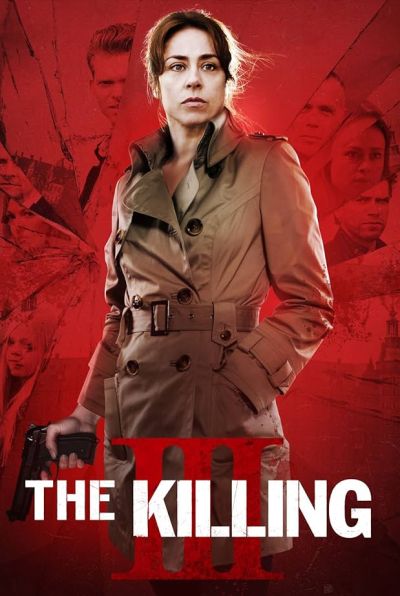 For perhaps the first occasion, the suffering of the family members left behind after a beloved person dies, is shown in what feels like almost real-time. That’s remarkable, as in almost any crime story I have ever seen, these feelings are usually only vocalized in one or two sentences. Just recently, I watched an old Italian giallo and it felt almost ridiculous how the main character seemed hardly moved at all, as her entire family was exterminated, one by one. Is such behavior normal? Normal people mourn their beloved ones. Maybe some do it more quietly than others, but most movies or series leave this, very important, aspect out, with it usually secondary to finding the perpetrator. The Killing takes that time, showing us the after-effects on a family barely able to go on, needing psychological help, and taking pointless, misguided revenge, with acts that can’t bring back what has been lost.
For perhaps the first occasion, the suffering of the family members left behind after a beloved person dies, is shown in what feels like almost real-time. That’s remarkable, as in almost any crime story I have ever seen, these feelings are usually only vocalized in one or two sentences. Just recently, I watched an old Italian giallo and it felt almost ridiculous how the main character seemed hardly moved at all, as her entire family was exterminated, one by one. Is such behavior normal? Normal people mourn their beloved ones. Maybe some do it more quietly than others, but most movies or series leave this, very important, aspect out, with it usually secondary to finding the perpetrator. The Killing takes that time, showing us the after-effects on a family barely able to go on, needing psychological help, and taking pointless, misguided revenge, with acts that can’t bring back what has been lost.
Admittedly, they might have gone on in this direction a bit too much – especially in the first season, which is twice as long as the others – and I was starting to look at my watch. Though things are always happening, you may lose a bit of patience as yet another suspect is presented to you. What, they are proven innocent? Okay, how about this one? Oh, and there is new evidence, it might actually have been the one we let off the hook last episode! And so on.
In all three seasons, a pattern of political involvement is found. For example, a pool car belonging to a political party might have been involved in a kidnapping, with the story taking place in the run-up to elections. Suddenly, the whole process of parties in electoral battle mode can be affected by the outcome of the investigations, as well as individuals’ dirty laundry being brought up by the other side or the police. One of the main politicians in the first season is played by Lars Mikkelsen (Mads’ brother), who’d go on to play a great villain in the Benedict Cumberbatch “Sherlock” show. In other seasons, the police have to deal with other institutions and organizations hampering their work, such as the military or the secret service. The third season deals with a major industrial corporation, as the company chief’s daughter is kidnapped and might be held in one of his shipping containers.
But the main character is always the introverted police commissioner, Sarah Lund (Gråbøl). Lund doesn’t come across as the most accessible character, to say the least. It’s a character trait she shares with her sisters in spirit, Salander and Norén. Though of the three, she might be the most “normal”, and her biggest problem an inability to communicate. Maybe it’s too cold in Denmark, and you don’t want to open your mouth if it’s not necessary? She can be quite talkative – when it’s about the case. But it’s always about the case and not her family. In season one, Lund’s fiancé and son wait for her to come to them in Sweden. Though she wants it, there is always something. Her superior insists she has to continue her work, as the only one who can, despite her successor already waiting in the wings. Even after boarding the plane, she returns once again to solve crime for another day in Copenhagen. Then everything changes when her colleague gets shot.
She gets smarter in the second season, now carrying her gun with her at all times. This will save her life at the end of the series, which deals with a series of murders of former Danish soldiers. Sometimes you can’t solve everything just with your mind! But there is always an apparent lack of social competence. Lund doesn’t seem to understand the emotional needs of her family (and others) and that’s why she loses them. The case is always more important for her. She becomes quite obsessive in her investigations – even after everyone, including her new chief Brix (Morten Suurballe) sees a case as solved. You thought Columbo with his, “There is still a little question I have…”, could get on your nerves? Wait, until you meet Sarah Lund!
There is a learning curve and character arc for the character. She is hesitant to come back to work in season 2, and in season 3 realizes that she has failed, not only as a mother but in her social life in general. She would like to have a closer relationship with her son, but he doesn’t want anything to do with her anymore. She manages to take care of his pregnant girl-friend, though even in front of the hospital room where the girl and her son are holding her newborn grandchild, she still turns around because… Well, you know… The case… Ultimately, the show can be seen as a tragedy. Yes, the cases all get solved in the end. But that doesn’t mean that we get a truly happy ending.
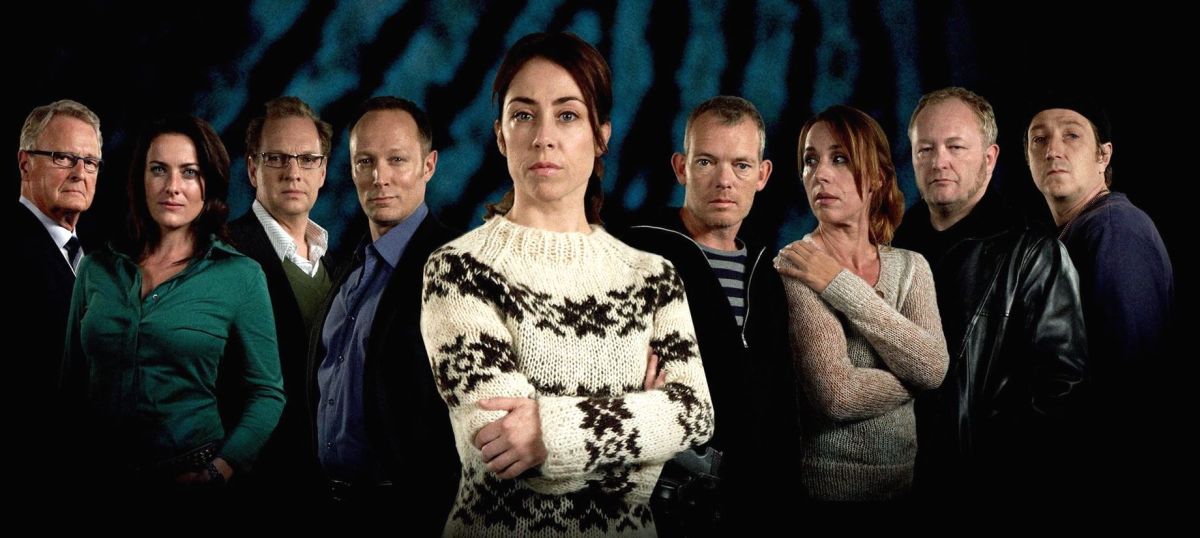 Season 1. The father of the murdered girl kills the murderer, and will most likely go into prison for that. Season 2. The minister of justice uncovers the corruption of the ruling government, but can’t do anything against it, as everyone is covering it up. He can only decide between joining them, thereby keeping his career, or quitting. Season 3 is the worst of all. While the kidnapped girl is saved, the industrialist must remain silent about the cover-up of his board of directors, in order to keep the company going. Meanwhile, Lund finds out who raped and murdered another girl years ago, and sees no alternative but to shoot the murderer. The ending has her leaving her home country, perhaps to return one day with new evidence to justify the killing, instead of finally getting together with a past love from her youth (Kass, who would later enjoy success as Jussi Adler-Olsen’s Carl Mørck).
Season 1. The father of the murdered girl kills the murderer, and will most likely go into prison for that. Season 2. The minister of justice uncovers the corruption of the ruling government, but can’t do anything against it, as everyone is covering it up. He can only decide between joining them, thereby keeping his career, or quitting. Season 3 is the worst of all. While the kidnapped girl is saved, the industrialist must remain silent about the cover-up of his board of directors, in order to keep the company going. Meanwhile, Lund finds out who raped and murdered another girl years ago, and sees no alternative but to shoot the murderer. The ending has her leaving her home country, perhaps to return one day with new evidence to justify the killing, instead of finally getting together with a past love from her youth (Kass, who would later enjoy success as Jussi Adler-Olsen’s Carl Mørck).
As there never was a fourth season, she might still be searching that evidence abroad. But happy endings certainly look different in Scandinavia. After all is said though, this is a good show with great and convincing actors. You can enjoy its complex story-lines, its gritty, sometimes almost cynical, world view and darkness, if you are willing to be patient and have enough time. The second and third seasons are much easier to watch than the first. The Scandinavian approach to crime series is definitely different one from what other European or American series offer their audiences. But if you get used to them, they can be quite addictive as this show showed. On its release, The Killing became especially successful in Great Britain, which might then have drawn the attention of American producers in this direction.
It started the new wave of Scandinavian noir in 2007, which seems to have lasted for about a decade, ending ten years later in the Hollywood adaptation of Jo Nesbø’s The Snowman, with Michael Fassbender as Harry Hole. But if you are in the mood for more psychologically damaged, Scandinavian, anti-heroines, you’ll find plenty of others, such as Annika Bengtzon or Rebecka Martinsson. There are also reports that Amazon Prime is planning a new show on good ol’ Lisbeth Salander. Who knows, maybe the era of troubled Scandinavian female investigators isn’t over yet?
Creator: Søren Sveistrup
Star: Sofie Gråbøl, Søren Malling, Mikael Birkkjær, Nikolaj Lie Kaas





 The easiest way to describe this is a Thai version of
The easiest way to describe this is a Thai version of  Despite my relentlessly commitment to sit through any film with an action heroine that strays across my radar, I’ll admit to suppressing an inward wince, when the film started and the ‘Lifetime Movies’ logo popped up. This origin was news to me. However, I was literally a captive viewer, since I was sitting on a plane to Mexico, so couldn’t exactly pop up and put on something else. At least it did mean I wasn’t going to end up uncomfortably trying to hide my screen from fellow passengers. This has occasionally happened previously, after an ill-considered choice of in-flight entertainment. Inevitably when I’m occupying the middle seat. Say what you like, Lifetime TVMs are safe.
Despite my relentlessly commitment to sit through any film with an action heroine that strays across my radar, I’ll admit to suppressing an inward wince, when the film started and the ‘Lifetime Movies’ logo popped up. This origin was news to me. However, I was literally a captive viewer, since I was sitting on a plane to Mexico, so couldn’t exactly pop up and put on something else. At least it did mean I wasn’t going to end up uncomfortably trying to hide my screen from fellow passengers. This has occasionally happened previously, after an ill-considered choice of in-flight entertainment. Inevitably when I’m occupying the middle seat. Say what you like, Lifetime TVMs are safe.  Always a pleasure to cross another country off the map, and this is the first movie we have ever reviewed here from Nigeria. Indeed, entries from anywhere in Africa have been very limited, and in general, I found this a pleasant surprise. In some countries, film-makers appear to be trying simply to imitate Hollywood. That’s not the case here: this
Always a pleasure to cross another country off the map, and this is the first movie we have ever reviewed here from Nigeria. Indeed, entries from anywhere in Africa have been very limited, and in general, I found this a pleasant surprise. In some countries, film-makers appear to be trying simply to imitate Hollywood. That’s not the case here: this 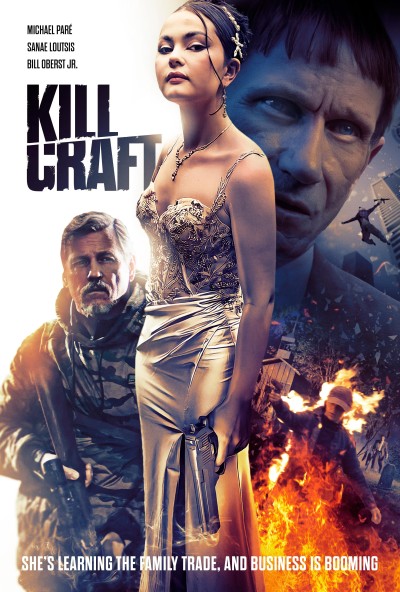 There is potential in the idea here. It’s a shame it ends up feeling like two separate movies, both of which come out feeling under-cooked. The main focus is on Marina Delon (Loutsis), a teenage girl with the typical teenage girl problems, e.g. bickering parents, generally sullen demeanour, etc. Except, her dad Thomas (Paré) is actually an assassin, working for the very strange Poe (Oberst). This has contributed to the marital strife, because his work is why mom is in a wheel-chair – and is not happy about it, to put it mildly. However, things are up-ended after Thomas is killed on a job, and Marina decides to take over the family business.
There is potential in the idea here. It’s a shame it ends up feeling like two separate movies, both of which come out feeling under-cooked. The main focus is on Marina Delon (Loutsis), a teenage girl with the typical teenage girl problems, e.g. bickering parents, generally sullen demeanour, etc. Except, her dad Thomas (Paré) is actually an assassin, working for the very strange Poe (Oberst). This has contributed to the marital strife, because his work is why mom is in a wheel-chair – and is not happy about it, to put it mildly. However, things are up-ended after Thomas is killed on a job, and Marina decides to take over the family business.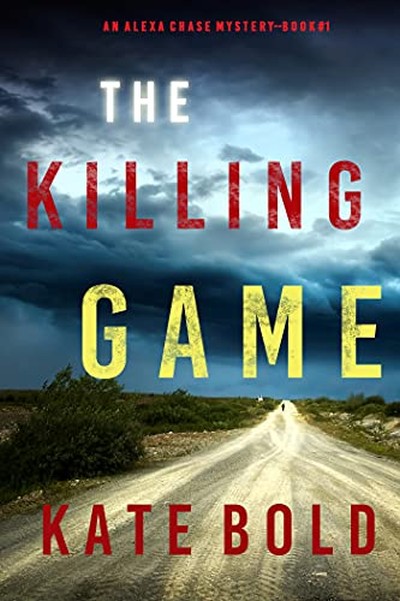 Bold is an incredibly prolific author, whose site lists eight separate series of novels, with a total of
Bold is an incredibly prolific author, whose site lists eight separate series of novels, with a total of  Reviewing director Profitt’s filmography on the IMDb is an interesting experience. He seems to have started off in the paranormal, drifted through pseudo-reality TV with titles like Untold Undercover Police Stories, and has now found a niche in the low-budget urban gangster field, for which Tubi seems to have an inexhaustible appetite. But the promise very much exceeds the product. Case in point: while the woman on the cover here
Reviewing director Profitt’s filmography on the IMDb is an interesting experience. He seems to have started off in the paranormal, drifted through pseudo-reality TV with titles like Untold Undercover Police Stories, and has now found a niche in the low-budget urban gangster field, for which Tubi seems to have an inexhaustible appetite. But the promise very much exceeds the product. Case in point: while the woman on the cover here 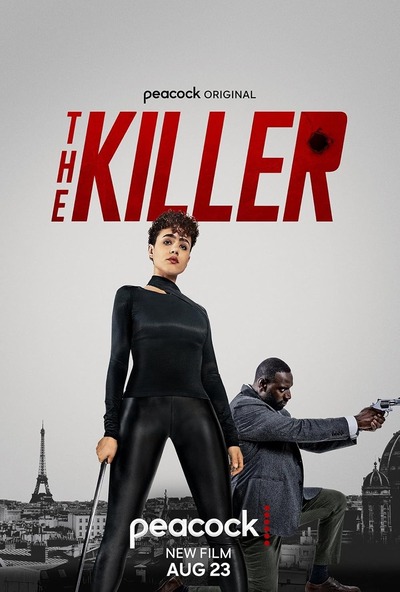 Back in 1990, I saw the original version of The Killer at the ICA in London. I’d never seen anything like it, and didn’t quite know what to think. But it kindled a deep fondness for Hong Kong cinema, and it’s also likely one of the most influential action films of the decade, whose impact is still being felt today. I wasn’t sure what to think about a remake, especially a gender-swapped one. These rarely work – hello, Ghostbusters. But at least this one was going to be done by the original director. Especially after having enjoyed his
Back in 1990, I saw the original version of The Killer at the ICA in London. I’d never seen anything like it, and didn’t quite know what to think. But it kindled a deep fondness for Hong Kong cinema, and it’s also likely one of the most influential action films of the decade, whose impact is still being felt today. I wasn’t sure what to think about a remake, especially a gender-swapped one. These rarely work – hello, Ghostbusters. But at least this one was going to be done by the original director. Especially after having enjoyed his  There’s something to be said for sparse simplicity, and this delivers on that concept in spades. Except for occasional flashbacks, the entire things takes place in one location: a facility somewhere in Europe. It’s where Cassie ends up, locked in a cage, after being abducted while on a trip from Britain, intending to find herself. She’s then deposited in a hall and made to fight for the amusement, gambling or whatever of online spectators. She starts off facing animals, but through pharmaceutical treatment, her strength, speed and savagery are enhanced, and the opponents – both fauna and, eventually, her own species too – become more vicious. The shock collar around her neck ensures her compliance.
There’s something to be said for sparse simplicity, and this delivers on that concept in spades. Except for occasional flashbacks, the entire things takes place in one location: a facility somewhere in Europe. It’s where Cassie ends up, locked in a cage, after being abducted while on a trip from Britain, intending to find herself. She’s then deposited in a hall and made to fight for the amusement, gambling or whatever of online spectators. She starts off facing animals, but through pharmaceutical treatment, her strength, speed and savagery are enhanced, and the opponents – both fauna and, eventually, her own species too – become more vicious. The shock collar around her neck ensures her compliance.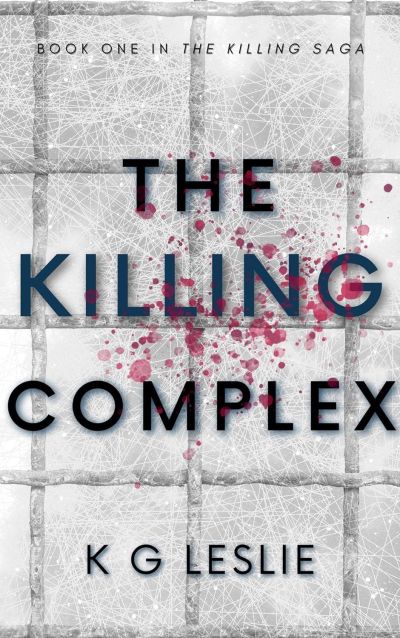 In the early going, much of this unfolds inside Cassie’s head, as she goes through what perhaps seems inspired by the five stages of grief, from rejecting the reality of her predicament, through anger, and ending up in a personal commitment to do whatever is necessary in order to survive – even if this comes at the cost of her own humanity. But just when she’s on the edge of becoming a soulless killing machine, she’s relocated, and placed next to another prisoner, Thomas. He was also abducted, but more recently, so hasn’t been ground down by his situation yet, and his optimism reignites Cassie’s own interest in life. But is everything quite what it seems, or are there other agendas at work?
In the early going, much of this unfolds inside Cassie’s head, as she goes through what perhaps seems inspired by the five stages of grief, from rejecting the reality of her predicament, through anger, and ending up in a personal commitment to do whatever is necessary in order to survive – even if this comes at the cost of her own humanity. But just when she’s on the edge of becoming a soulless killing machine, she’s relocated, and placed next to another prisoner, Thomas. He was also abducted, but more recently, so hasn’t been ground down by his situation yet, and his optimism reignites Cassie’s own interest in life. But is everything quite what it seems, or are there other agendas at work?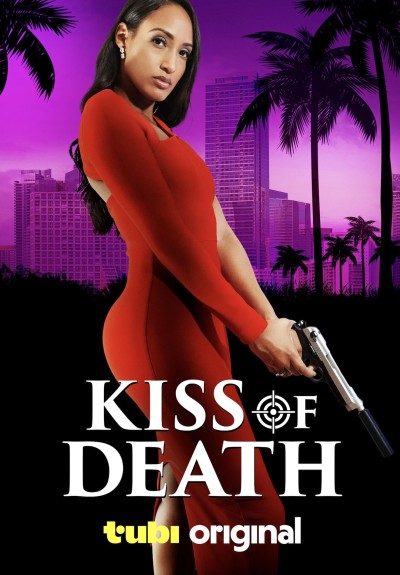 The relationship between Mykah (Leason) and Jameson (Chandler) is quickly heading for the rocks, as the honesty between them has evaporated. He suspects her of lying to him and having an affair: and he’s half-right. For Mykah is misleading him about the reason for her odd hours, though it is work-related as she claims. It’s just that her job is as an assassin, who kills the husbands of battered women, assisted by family friend Lady (Frazier). After successfully offing a prospective politician, Mykah’s next job is Dyson (Jackson), after his wife Chantelle tearfully tells her story of abuse, and offers to pay half a million dollars for a job well done.
The relationship between Mykah (Leason) and Jameson (Chandler) is quickly heading for the rocks, as the honesty between them has evaporated. He suspects her of lying to him and having an affair: and he’s half-right. For Mykah is misleading him about the reason for her odd hours, though it is work-related as she claims. It’s just that her job is as an assassin, who kills the husbands of battered women, assisted by family friend Lady (Frazier). After successfully offing a prospective politician, Mykah’s next job is Dyson (Jackson), after his wife Chantelle tearfully tells her story of abuse, and offers to pay half a million dollars for a job well done.